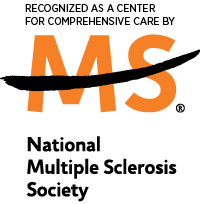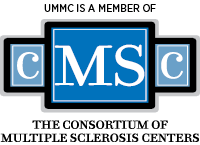Vision and Multiple Sclerosis
For many people, the first inkling they have multiple sclerosis is visual.
In fact, for up to half of MS patients, a visual problem is the first symptom. And almost all MS patients will have some type of visual disturbance in their lifetimes.
Double vision is common because MS keeps the eyes from working together. Patients also may have trouble reading or watching television because the image shakes. One of the most common vision issues for people with MS is optic neuritis, which can cause loss of vision in one eye.
As the name multiple sclerosis implies, patients experience multiple events at multiple times. That's called attack, relapse and exacerbation. Any individual system may get better within weeks or months, but then other symptoms develop.
A neuro-ophthalmologist can help. To make an appointment with a neuro-ophthalmologist, please call 667-214-1111.
What is a neuro-ophthalmologist?
Ophthalmologists treat eye and visual problems, and neurologists deal with issues of the brain. A neuro-ophthalmologist is in the middle, handling brain issues that affect vision.
Neuro-ophthalmologists treat many vision disorders in addition to those associated with MS. For instance, stroke, aneurysms and brain tumors can all present with visual problems.
The UM Center for Multiple Sclerosis Treatment and Research works closely with neuro-ophthalmologists at the University of Maryland School of Medicine's Department of Ophthalmology to treat visual disorders in our patients.
Optic Neuritis
Optic neuritis is a specific kind of inflammation of the optic nerve. The optic nerve is like a cable that connects the eyes, which take in visual information, to the brain, which processes it.
If the optic nerve becomes inflamed due to multiple sclerosis, we refer to that as optic neuritis. However, it is possible to have optic neuritis without MS.
Optic neuritis usually gets better on its own. However, we frequently treat it steroids because they offer instant relief.
If you have optic neuritis, you could have multiple sclerosis. However, an MS patient typically has multiple episodes over time. With a single event, the question is whether you will go on to have other issues.
To aid in diagnosis, we often use an MRI, a non-invasive way to image the brain. If your MRI shows that you have optic neuritis with white spots that look like plaque, then you're at higher risk of developing MS than if you had a normal MRI.
Emergency Eye Care
If you or someone you know has sudden vision problems, you should contact a physician immediately.
Emergency eye care is available 24 hours a day, seven days a week. Call 667-214-1111 and ask for the ophthalmologist on call.
What is a neuro-ophthalmologist?
Toggle accordion itemWhat is optic neuritis and how does it affect patients with MS?
Toggle accordion itemHow would you determine if optic neuritis is due to MS or another cause?
Toggle accordion itemIf someone is having a sudden onset of vision problems, is it an urgent situation requiring treatment from a specialist?
Toggle accordion itemHow do the eyes and brain work together to enable us to see?
Toggle accordion itemWhy do headaches and migraine headaches sometimes cause visual disturbances?
Toggle accordion itemWhat are some other neurological conditions that can lead to vision changes?
Toggle accordion itemMany people experience trouble with their vision as they get older, is this part of normal aging?
Toggle accordion item

